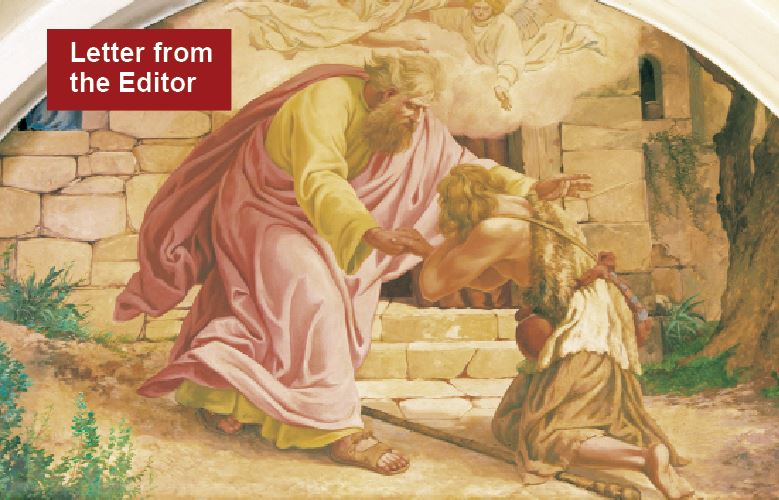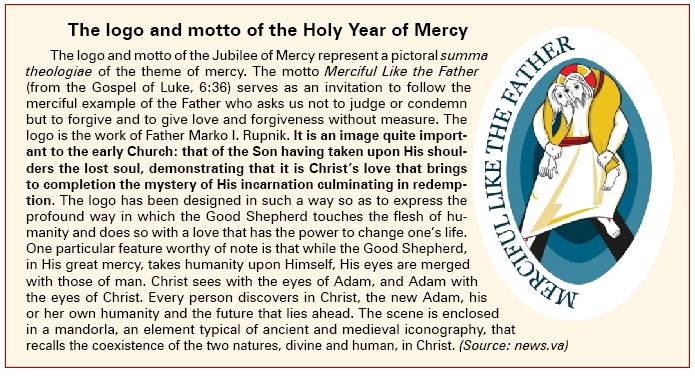“Be merciful just as your Father is merciful”
 The return of the prodigal son, by Joseph Kastner, Erloserkirche Church, Vienna The return of the prodigal son, by Joseph Kastner, Erloserkirche Church, Vienna |
by Alain Pilote, Editor
As you will have noticed, the theme of this issue of MICHAEL is the extraordinary Holy Year, the “Jubilee of Mercy” proclaimed by Pope Francis, beginning on December 8, 2015, feast of the Immaculate Conception, and ending on November 20, 2016, feast of Christ the King. We felt this a subject of such great importance that it deserved a little longer editorial than usual.
To feed our meditation on this Year of Mercy, it is only natural to use the Bull of Indiction of the Jubilee written by Pope Francis, Misericordiae Vultus (the face of the Father’s mercy), in other words, Jesus Himself who, by becoming Incarnate in the flesh, gave a human face to the love of the Holy Trinity. One can read in the text of the Holy Father:
“It is proper to God to exercise mercy, and He manifests His omnipotence particularly in this way”. Saint Thomas Aquinas’ words show that God’s mercy, rather than a sign of weakness, is the mark of his omnipotence.
“In the parables devoted to mercy, Jesus reveals the nature of God as that of a Father who never gives up until He has forgiven the wrong and overcome rejection with compassion and mercy. We know these parables well, three in particular: the lost sheep, the lost coin, and the father with two sons (cf. Lk 15:1-32). In these parables, God is always presented as full of joy, especially when He pardons. In them we find the core of the Gospel and of our faith, because mercy is presented as a force that overcomes everything, filling the heart with love and bringing consolation through pardon.”
In a meditation on the parable of the prodigal son, Archbishop Christian Lépine, of Montreal, said: “In the order of love, we have God as Father, but every human being is our brother or sister. In the order of love, it is not enough to be a child of God, we must also be the brothers and sisters of one another.”
Let us continue with the words of Pope Francis:
“We want to live this Jubilee Year in light of the Lord’s words: Merciful like the Father. The Evangelist reminds us of the teaching of Jesus who says, “Be merciful just as your Father is merciful” (Lk 6:36). It is a programme of life as demanding as it is rich with joy and peace... Merciful like the Father, therefore, is the “motto” of this Holy Year.
“Let us open our eyes and see the misery of the world, the wounds of our brothers and sisters who are denied their dignity, and let us recognize that we are compelled to heed their cry for help! May we reach out to them and support them so they can feel the warmth of our presence, our friendship, and our fraternity! May their cry become our own, and together may we break down the barriers of indifference that too often reign supreme and mask our hypocrisy and egoism!”
These words of Pope Francis remind us of the prayer of the missionary of mercy (see page 48), as dictated by Jesus to Saint Faustina Kowalska, a Polish nun who was called by Our Lord to be the Apostle of Divine Mercy. (See pages 8 to 13.) In numerous approved locutions, Jesus revealed to her the depths of His mercy, especially through the painting (Jesus, I trust in You) and also the Chaplet of Divine Mercy. (See pages 24 and 25.)
The works of mercy
Pope Francis then explains what are the works of mercy: “It is my burning desire that, during this Jubilee, the Christian people may reflect on the corporal and spiritual works of mercy. It will be a way to reawaken our conscience, too often grown dull in the face of poverty. And let us enter more deeply into the heart of the Gospel where the poor have a special experience of God’s mercy. Jesus introduces us to these works of mercy in his preaching so that we can know whether or not we are living as His disciples.
“Let us rediscover these corporal works of mercy: to feed the hungry, give drink to the thirsty, clothe the naked, welcome the stranger, heal the sick, visit the imprisoned, and bury the dead. And let us not forget the spiritual works of mercy: to counsel the doubtful, instruct the ignorant, admonish sinners, comfort the afflicted, forgive offences, bear patiently those who do us ill, and pray for the living and the dead. (See page 46.)
 “We cannot escape the Lord’s words to us, and they will serve as the criteria upon which we will be judged: whether we have fed the hungry and given drink to the thirsty, welcomed the stranger and clothed the naked, or spent time with the sick and those in prison (cf. Mt 25:31-45).
“We cannot escape the Lord’s words to us, and they will serve as the criteria upon which we will be judged: whether we have fed the hungry and given drink to the thirsty, welcomed the stranger and clothed the naked, or spent time with the sick and those in prison (cf. Mt 25:31-45).
“Moreover, we will be asked if we have helped others to escape the doubt that causes them to fall into despair and which is often a source of loneliness; if we have helped to overcome the ignorance in which millions of people live, especially children deprived of the necessary means to free them from the bonds of poverty; if we have been close to the lonely and afflicted; if we have forgiven those who have offended us and have rejected all forms of anger and hate that lead to violence; if we have had the kind of patience God shows, who is so patient with us; and if we have commended our brothers and sisters to the Lord in prayer.
“In each of these ‘little ones,’ Christ Himself is present. His flesh becomes visible in the flesh of the tortured, the crushed, the scourged, the malnourished, and the exiled… to be acknowledged, touched, and cared for by us. Let us not forget the words of Saint John of the Cross: ‘as we prepare to leave this life, we will be judged on the basis of love.’”
As Pope Francis just listed, one of the spiritual works of mercy is to instruct the ignorant. We attempt to accomplish a spiritual work of mercy by publishing and distributing MICHAEL, which instructs people about faith in Jesus, of course, but also about our rights and duties and the swindle of the current financial system, while providing a solution that will respect the human person and all other principles of the Church.
It is the ignorance of the people that maintains the strength of the financiers; for this reason Louis Even founded MICHAEL as a means to spread knowledge of economic democracy, also called the Social Credit solution, what he described as “a light unto my path.” (See pages 32 to 39.)
This holy year is also of course an appropriate time for experiencing God’s mercy through the sacrament of forgiveness. God is always ready to forgive; the only thing He asks of us is contrition, to regret our sins. (See pages 14 to 17.) Pope Francis wrote:
“May the message of mercy reach everyone, and may no one be indifferent to the call to experience mercy. I direct this invitation to conversion even more fervently to those whose behaviour distances them from the grace of God. I particularly have in mind men and women belonging to criminal organizations of any kind. For their own good, I beg them to change their lives. I ask them this in the name of the Son of God who, though rejecting sin, never rejected the sinner. Do not fall into the terrible trap of thinking that life depends on money and that, in comparison with money, anything else is devoid of value or dignity. This is nothing but an illusion! We cannot take money with us into the life beyond. Money does not bring us happiness. Violence inflicted for the sake of amassing riches soaked in blood makes one neither powerful nor immortal. Everyone, sooner or later, will be subject to God’s judgment, from which no one can escape.
“This is the opportune moment to change our lives! This is the time to allow our hearts to be touched! When faced with evil deeds, even in the face of serious crimes, it is the time to listen to the cry of innocent people who are deprived of their property, their dignity, their feelings, and even their very lives. To stick to the way of evil will only leave one deluded and sad. True life is something entirely different. God never tires of reaching out to us. He is always ready to listen, as I am too, along with my brother bishops and priests. All one needs to do is to accept the invitation to conversion and submit oneself to justice during this special time of mercy offered by the Church.”
Let us conclude with this prayer for the Jubilee Year of Mercy, composed by Pope Francis:
Lord Jesus Christ, you have taught us
to be merciful like the heavenly Father,
and have told us that whoever sees you sees Him.
Show us your face and we will be saved.
Your loving gaze freed Zacchaeus and Matthew from being enslaved by money;
the adulteress and Magdalene from seeking happiness only in created things;
made Peter weep after his betrayal,
and assured Paradise to the repentant thief.
Let us hear, as if addressed to each one of us, the words that you spoke to the Samaritan woman: “If you knew the gift of God!”
You are the visible face of the invisible Father,
of the God who manifests his power above all by forgiveness and mercy:
let the Church be your visible face in the world, its Lord risen and glorified.
You willed that your ministers would also be clothed in weakness
in order that they may feel compassion for those in ignorance and error:
let everyone who approaches them feel sought after, loved, and forgiven by God.
Send your Spirit and consecrate
every one of us with its anointing,
so that the Jubilee of Mercy may be
a year of grace from the Lord,
and your Church, with renewed enthusiasm, may bring good news to the poor,
proclaim liberty to captives and the oppressed,
and restore sight to the blind.
We ask this through the intercession of Mary, Mother of Mercy, you who live and reign
with the Father and the Holy Spirit
for ever and ever.
Amen.

